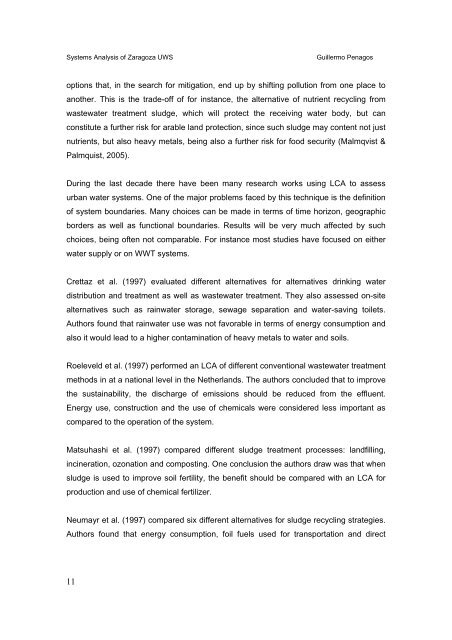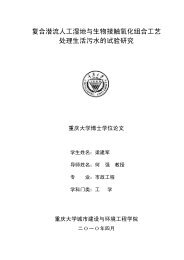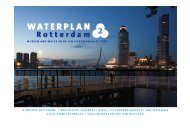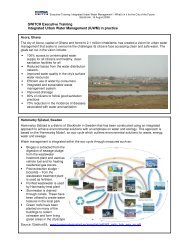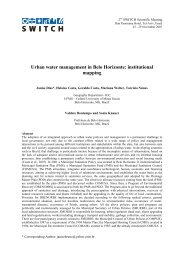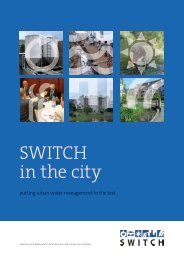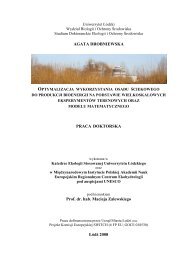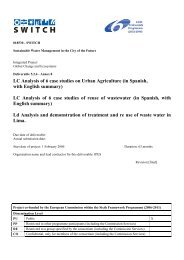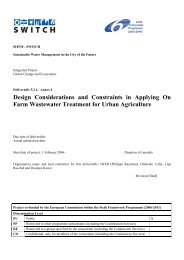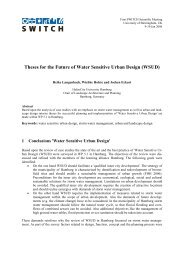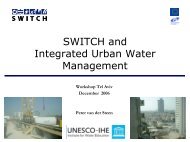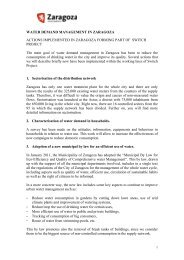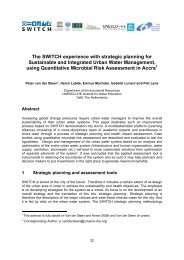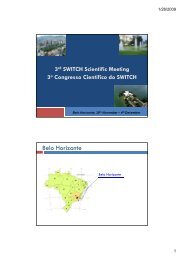Systems Analysis of Zaragoza Urban Water - SWITCH - Managing ...
Systems Analysis of Zaragoza Urban Water - SWITCH - Managing ...
Systems Analysis of Zaragoza Urban Water - SWITCH - Managing ...
You also want an ePaper? Increase the reach of your titles
YUMPU automatically turns print PDFs into web optimized ePapers that Google loves.
<strong>Systems</strong> <strong>Analysis</strong> <strong>of</strong> <strong>Zaragoza</strong> UWS<br />
Guillermo Penagos<br />
options that, in the search for mitigation, end up by shifting pollution from one place to<br />
another. This is the trade-<strong>of</strong>f <strong>of</strong> for instance, the alternative <strong>of</strong> nutrient recycling from<br />
wastewater treatment sludge, which will protect the receiving water body, but can<br />
constitute a further risk for arable land protection, since such sludge may content not just<br />
nutrients, but also heavy metals, being also a further risk for food security (Malmqvist &<br />
Palmquist, 2005).<br />
During the last decade there have been many research works using LCA to assess<br />
urban water systems. One <strong>of</strong> the major problems faced by this technique is the definition<br />
<strong>of</strong> system boundaries. Many choices can be made in terms <strong>of</strong> time horizon, geographic<br />
borders as well as functional boundaries. Results will be very much affected by such<br />
choices, being <strong>of</strong>ten not comparable. For instance most studies have focused on either<br />
water supply or on WWT systems.<br />
Crettaz et al. (1997) evaluated different alternatives for alternatives drinking water<br />
distribution and treatment as well as wastewater treatment. They also assessed on-site<br />
alternatives such as rainwater storage, sewage separation and water-saving toilets.<br />
Authors found that rainwater use was not favorable in terms <strong>of</strong> energy consumption and<br />
also it would lead to a higher contamination <strong>of</strong> heavy metals to water and soils.<br />
Roeleveld et al. (1997) performed an LCA <strong>of</strong> different conventional wastewater treatment<br />
methods in at a national level in the Netherlands. The authors concluded that to improve<br />
the sustainability, the discharge <strong>of</strong> emissions should be reduced from the effluent.<br />
Energy use, construction and the use <strong>of</strong> chemicals were considered less important as<br />
compared to the operation <strong>of</strong> the system.<br />
Matsuhashi et al. (1997) compared different sludge treatment processes: landfilling,<br />
incineration, ozonation and composting. One conclusion the authors draw was that when<br />
sludge is used to improve soil fertility, the benefit should be compared with an LCA for<br />
production and use <strong>of</strong> chemical fertilizer.<br />
Neumayr et al. (1997) compared six different alternatives for sludge recycling strategies.<br />
Authors found that energy consumption, foil fuels used for transportation and direct<br />
11


